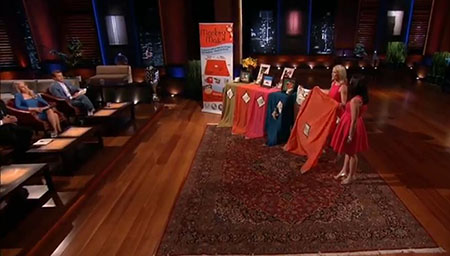MIT Alumna’s Startup Survives Shark Tank
-
-
slice.mit.edu
Filed Under
Recommended
 Christie Barany SM '00 makes her pitch on Shark Tank
Christie Barany SM '00 makes her pitch on Shark Tank
Imagine pitching your two-year-old startup to a panel of multi-millionaire entrepreneurs. Now imagine those potential investors dissecting your company’s potential—while nearly seven million people watch on television.
That scenario occurred for Christie Barany SM ’00 on April 5 when she promoted her company, Monkey Mat, on Shark Tank, a reality series that features business pitches from entrepreneurs to a panel of investors, or “sharks.”
“It was surreal,” says Barany. “The cameras start rolling and the sharks know nothing about you—then the questions start flying.”
Barany and business partner Courtney Tabor—the self-titled “Monkey Mat Mamas”—were seeking $100,000 in exchange for 30 percent stake in Monkey Mat, which sells 5’ x 5’ water-repellant mats that can be folded into a compact pouch. The company’s target audience is parents seeking a portable, clean surface that could be used at airports, picnics, and soccer games.
After their pitch, Barany and Tabor fielded questions—and criticism—from five sharks. One investor strongly disapproved of the mats’ then-price of $39.99 (“It needs to be $9.99!”) and another was unimpressed with their size and color. ("It's too small...and the colors are off.")
“Obviously you want every shark to be interested,” Barany says. “But the great thing is that it happens so fast, you don’t have any time to take it personally.”

Others were more receptive; shark Mark Cuban said he loved the product and shark Lori Greiner believed she could lower the sale price. Cuban and Greiner made an offer: $100,000 for a 35 percent stake in the company.
The Monkey Mat Mamas quickly accepted the handshake deal. (Watch the April 5 Shark Tank episode.)
“We were thrilled,” she says. “It was validation because we weren’t willing to compromise the quality to lower the price.”
Although the episode aired on April 5, filming took place in July 2013 following a months-long application process. Pitches are condensed into a 10-minute segment for TV, but in reality, many pitches can take more than an hour.
“We’ve tried to recreate the pitch so many times,” she says. “The dialogue went in so many different directions. They definitely focused on the price point during the show.”
In the nine-month period between the actual pitch and the show’s airing, Barany and Tabor have worked with closely with Cuban and Greiner to grow the product. Thanks in part to the sharks’ experience in manufacturing and retail, Monkey Mat was able to lower its price to $19.99.
“We’re amazed at how accessible they are,” she says. “They have so much on their plate but they are always available. They’re helping us expand the company with a lower cost and new price in a broader market.”
Barany co-founded Monkey Mat in 2012 after a career in the medical device and biotechnology industry. She says reaction from the Shark Tank appearance was instantaneous and overwhelming.
“Building this company is the most challenging thing I’ve ever done,” she says. “The response has been great, and because of DVR, it’s still coming. But the challenges that come with an MIT education—pushing boundaries and working through the night—has really prepared me.”







